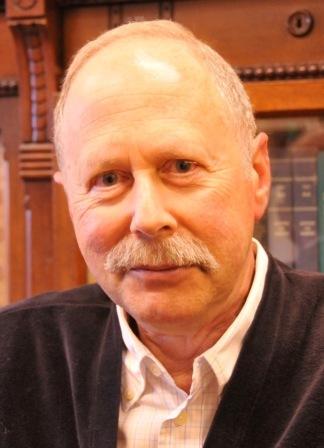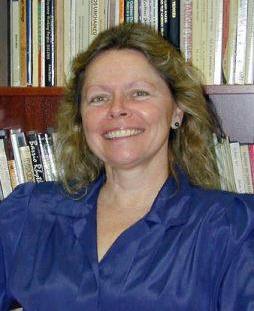June 2014
Komar, Dimsdale to Receive Senate's Highest Honor
Professors Kathleen Komar (UCLA) and Joel Dimsdale (UCSD) are the 2014 recipients of the Oliver Johnson Award for Distinguished Senate Service.


Kathleen Komar is Professor of Comparative Literature at UCLA. She served as chair of the UCLA Academic Senate in 2004-05, was a member of the Academic Advisory Committee in the search for a new UC President in 2007, and chaired the Academic Advisory Committee in the search for a new UCLA Chancellor in 2006. At UCLA, she also chaired the Council on Academic Personnel and was a member of the Senate Executive Board, the Undergraduate Council, and the Graduate Council Committee on Degree Programs.
Joel Dimsdale, M.D. is Distinguished Professor Emeritus in the Department of Psychiatry at UCSD. He was chair of the UCSD Division of the Academic Senate in 2002-03. He also chaired that campus’s Committee on Committees in 2005-06, and was a member and Chair of the UCSD School of Medicine Faculty Executive Council. At the systemwide level, he chaired the University Committee on Faculty Welfare in 2010-11 and was a member of the University Committee on Academic Personnel and the Academic Council. Most recently, he served as a member of the Academic Advisory Committee for the selection of a UC President in 2013.
The Senate Source asked Professors Komar and Dimsdale to respond to a few questions about their work in the Senate and the challenges facing the University. Their responses are reproduced below, in full.
Senate Source: What is your reaction to being named a recipient of the 2014 Oliver Johnson Award for Distinguished Service in the Academic Senate?
Komar: I was both honored and humbled. I have worked with so many dedicated faculty members that I feel a bit unworthy. I share this honor with all of them. But I can't think of an award I would be more proud to win! And I am grateful to the many faculty and staff who worked on my nomination.
Dimsdale: I was absolutely delighted. The Senate has meant a great deal to me over the years. Senate service is voluntary; you have to believe in the importance of the work and to contribute your time. Shakespeare said it clearly: “Our praises are our wages.” Receiving the Oliver Johnson Award is praise indeed, and I am very grateful.
What do you view as the most significant highlights of your divisional and systemwide Senate service? What accomplishments or issues do you feel most proud to have been a part of?
Komar: There were, as always, many specific issues that came during my tenure. I served on the search committee for both a new UC president and for a new UCLA Chancellor. I feel that service on the Undergraduate Council and Graduate Council were crucial to help to shape the academic mission of the university. Serving on our Council on Academic Personnel was a wonderful experience that allowed me to see the truly inspiring work of my colleagues across our entire campus. But I think I am most proud of helping to sustain a system of genuinely shared governance. It is more work by far than some other models--but I believe it is the system best designed to harness the abilities of faculty members and administrators in maintaining an intellectually superior public university.
Dimsdale: Three things come to mind. I used to have an aphorism posted above my computer in my office: “Remember, you have two ears and one mouth.” I’ve used this as a reminder about the importance of being a good “listener” for the University. The Senate always needs listeners who are willing to take the time to understand and appreciate our remarkable complexity and diversity. We have a wonderful opportunity to learn from each other and to impact our world through discovery, teaching, and service.
For many years, I have advocated for student mental health. I co-chaired a systemwide taskforce with UC Santa Barbara Vice Chancellor Michael Young. We were like circuit riders for student mental health, visiting the campuses to meet with students, counseling center staff, concerned parents, and the Regents to find out what important issues needed to be addressed. Student mental health needs are still major concerns, as recent news reports demonstrate, but I think the report we wrote suggests a way forward.
More recently, I have turned my attention to issues of faculty welfare. We have wonderful faculty members in all corners of academia, but the UC working conditions and remuneration have lost their luster and we risk losing our faculty to other universities. My colleagues and I on UCFW scrutinize issues such as salary, pension benefits, health insurance, as well as the profusion of regulations that are so time consuming and yet all-in-all provide so little benefit to anyone. The University is under pressure now and faculty members need vigilant and articulate spokesmen.
How can UC help reinvigorate public investment in higher education?
Komar: I know that the UC leaders work tirelessly to do this. And I believe that we need to keep highlighting our accomplishments in two different but related arenas. From the point of view of parents, we should underscore that the UC campuses serve to teach young people to think critically and deeply so that they are prepared to be the leaders of the future in every field. And from the point of view of the public good, we need to point out how much of our economic success is based on technology and research developed by UC faculty and staff. The intellectual power and cultural and ethnic diversity fostered in our universities gives us the capacity to continue to grow as a community, a state, and a country.
Dimsdale: We are the best-kept secret in the state. We need to be less effective in keeping our accomplishments a secret! I don’t think this problem is going to be solved until we do some careful long-range planning. It is not enough to say: “We need increased philanthropy.” That’s about as effective as standing on the street corner with a sign that says: “Will work for food.” Instead, as a first step, we should convene a retreat with internal and external stakeholders to review what “we” can offer and what the “community” is interested in. I put “we” and “community” in quotes because they both groups are complex and diverse in nature. I believe that previous efforts at long-range planning have fallen short of this goal.
What, in your eyes, are the biggest challenges facing the University now and into the future?
Komar: Making the public aware of just how crucial the University and its teaching and research programs are. We cannot allow financial exigencies in the near term to disable our long term abilities in research and development. If we are too short-sighted, we will lose valuable and irreplaceable programs that may be vital to our survival as a culture in the future.
Dimsdale: I see three very different types of challenges for the university.
First, like many government agencies, we failed to adequately fund our retirement system and spent that money elsewhere. Now, we owe billions of dollars to stabilize the system. The Senate has been arguing that it makes better fiscal sense to pay this debt off quickly rather than slowly. It’s a peculiar position for the Senate to be in. People think we faculty are all radicals, but it is the Senate that is advocating for fiscal conservatism.
Second, the University is filling up with provisional faculty who are not treated like full-fledged and valued members of our community. We need to treat these faculty members more respectfully. Do we really want to see the University move to a caste system overseen by a small minority of faculty members who preside over the multitudes of disenfranchised provisional faculty?
Third, we need to do a better job communicating our mission, our accomplishments, and our challenges.
What first motivated you to get involved with the Senate? And what would you say to new or existing faculty who are considering becoming involved in Senate service?
Komar: I got involved in the Senate because I wanted to be active in shaping the academic landscape of UCLA. I wanted to know what issues were at stake and how they would affect my field and the University at large. I wanted to have a voice in academic policy. And I wanted to know why different parts of the campus had such differing views on particular issues. What I didn't anticipate is how many of my closest friends I would meet on Senate committees. The Senate made me part of a much larger--and more fascinating--community. And it made me a happier camper even in the midst of much hard work. I got to know the faculty members who are engaged and enthusiastic, who never just throw in the towel or remain indifferent. They are the kind of company I like to keep. I think that is what I would stress to faculty considering Senate service--be an active part of your community at the University. It is quite an impressive and inspiring one!
Dimsdale: I got involved with the Senate because I like the model of “a community of scholars,” where Senate and administration work together.
Administrators sometimes accuse the Senate of dithering, and it is true that faculty tend to be oblivious to the external pressures and deadlines that the administration faces. On the other hand, I have found that administration is very welcoming to Senate input when we provide it quickly, even if our input is not in total agreement with the administration. Harmony doesn’t mean we all have to sing the same note.
New faculty members should pick an area they are interested in or want to learn more about and be willing to spend an hour or two/week on it. It is amazing how much can be done if you simply show up for meetings reliably, make an effort to understand the issues, restrain your impatience, and try to make some progress. I remember when my son was first learning to play soccer. The coach said, “Don’t always try for a goal. Just keep the ball moving.” You can get an enormous amount accomplished with that approach.
Oliver Johnson (1923-2000), was a UC Riverside professor of philosophy who served as Academic Senate chair in 1981-82; and as chair of the Riverside Division of the Academic Senate from 1963 to 1966, performing with great distinction in both posts. In 1996, Professor Johnson made a substantial gift to the systemwide Senate, the earnings from which are used to fund the award that bears his name. The Oliver Johnson Award is presented every other year to a Senate member or members in recognition of lifetime service to the Senate, outstanding and creative contributions to faculty governance at the divisional and systemwide level, and exceptional abilities in working with different University constituents.
